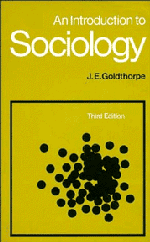1 - What is sociology?
Published online by Cambridge University Press: 05 July 2011
Summary
Sociology is an organized endeavour to increase human self-knowledge and self-understanding through the systematic study of our social life. For many sociologists, it represents an attempt to apply to the study of human society the same scientific method and approach that have been so dramatically successful in yielding an understanding of the physical world. Using scientific method, we have gained an understanding of the stars, the sun, the planets; of this planet in particular; of the forms of life that inhabit it; of man as an animal, and of the social behaviour of animals of species other than our own. The quest is far from finished, and the search for more knowledge and understanding goes on more ardently than ever in the modern world; but the achievements of science have been very great, and we now understand many things that were hidden from our ancestors.
Why not, then, apply the same methods to understanding ourselves? For the last 150 years or so some have done just that: they have tried to turn our scientific eye upon ourselves as social beings and study human social behaviour and social organization in the same spirit as others have studied physical or chemical phenomena, or the social behaviour and social organization of other animals. And though the findings may be modest and tentative compared with those of physics – and we certainly cannot claim anything as spectacular as space research – nevertheless the enterprise has yielded solid results, as the reader will be able to judge for himself from part 2 of this book.
- Type
- Chapter
- Information
- An Introduction to Sociology , pp. 3 - 30Publisher: Cambridge University PressPrint publication year: 1985
- 3
- Cited by



